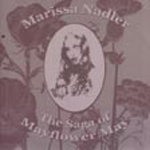|
|
 |
Dusted Reviews
Artist: Marissa Nadler Album: The Saga of Mayflower May Label: Eclipse Review date: Jun. 7, 2005 |

|
|
|
 |
One of the standout moments on Marissa Nadler’s debut, Ballads of Living and Dying, is her rendition of Edgar Allan Poe’s poem “Annabelle Lee.” Spectral and delicate, it fittingly caps a cycle of brief but exacting songs that E.A. himself might have appreciated, adhering as they do to the tenets of his famous Poetic Principle – burrowing into one’s consciousness like “the steady pressing down of the stamp upon the wax.”
Nadler, a New England-based singer and visual artist, follows a similar route on her sophomore album, The Saga of Mayflower May. While many critics cited Ballads of Living and Dying as a document that might have washed up from the folk boom of the 1960’s, the cover art of The Saga of Mayflower May – Nadler’s face framed in the oval of a Victorian-era daguerreotype, floating in disproportion to a wallpaper print straight out of a 19th century literary salon – gives a different indication to the singer’s sensibilities. Both eras are alive in her music, a rigorous and understated brand of folk that manages to be emotionally bracing while maintaining a classicist’s remove.
Nadler expands her palette ever so slightly for Mayflower May, employing Hammond organ, ukelele, bells, and backing vocals a bit more liberally than on her debut. But the bedrock foundation remains unchanged – immaculately plucked acoustic guitar, a warm wash of reverb, and Nadler’s rich, staid voice. And like Ballads of Living and Dying, The Saga of Mayflower May is a record that rewards immersion. Break the surface of the singer’s icy inflections and you find sticky languor and earthy grit woven into particular turns of phrase.
Nadler’s enchanting voice is so meticulously applied, her guitar lines so softly encircling, that her music can suffer from sounding overly studied. The best of these songs find a bit of room to sway, to press their steady tempos and prim inflections into something more of this world than the next. In “Calico”, Nadler moves the illusive subject of her song cycle over rivers and through forests, and the song seems to ripen along with its heroine (“Sell her to the gypsy, for a jar of metal coins / Take her to the mountain, and thrust yourself into her loins”). Nadler’s voice embodies the change, her breaths rising to become audible, her words smoldering with a dark, urgent energy.
This urgency carries into the album’s finale, “Horses and Their Kin”, a fevered dream cast in the moonlight of the Salem woods. The tinny guitar notes race forward, her voice tangling with a wind-whipped moan of vocal harmony. The song is neither as rigorous or rhythmic as “Annabelle Lee”, but it’s every bit as hauntingly macabre, boasting a quality of immediacy that can, at times, be absent in Nadler’s straight-backed folk. When it’s there, few in the New Folk clique can rival her bewitching talent.
By Nathan Hogan
|







